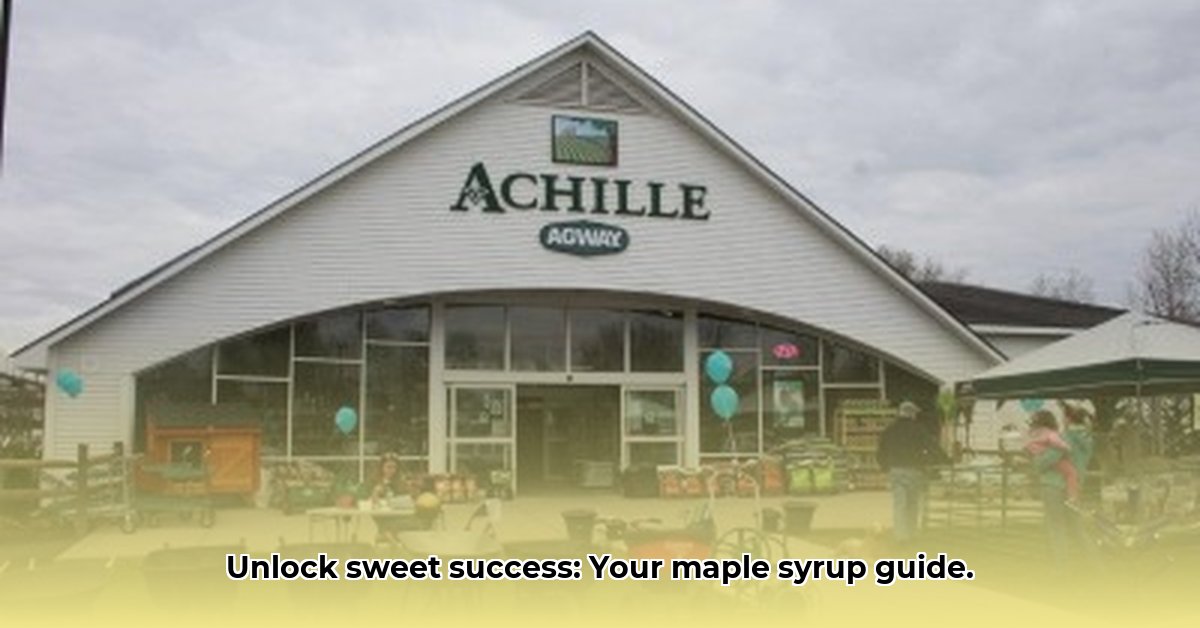
Achille Agway Hillsboro: Your Maple Syrup Business Booster
The sweet scent of maple syrup often masks the complex business behind its production. While tapping maple trees might seem straightforward, building a thriving maple syrup business requires strategic planning, efficient operations, and a keen understanding of the market. Achille Agway Hillsboro serves as a vital supplier, providing the essential tools and resources. But true success demands a broader approach, one that encompasses everything from optimizing your supply chain to crafting a compelling brand identity. This guide explores the key strategies for transforming your maple syrup operation into a profitable and sustainable enterprise.
Streamlining Your Syrup Empire: Supply Chain Optimization
Imagine your maple syrup production as a finely tuned machine. Each stage, from sap collection to bottling, must operate seamlessly. While Achille Agway provides the necessary supplies, the efficiency of your operation rests on your shoulders. How can you enhance productivity and minimize waste?
1. Inventory Control: Maintaining precise inventory levels is paramount. This prevents production delays caused by supply shortages and minimizes waste, keeping your operation running smoothly. Think of it like baking a cake – without enough flour, the entire process falters. This is true for your business as well.
2. Logistics: Getting Your Syrup to Market: Efficient transportation is vital for maintaining sap freshness and preventing spoilage. Developing relationships with local haulers not only reduces fuel costs but also decreases your environmental impact. Less travel translates to reduced expenses and a greener operation.
3. Reliable Sourcing: Finding Your Partners: Building strong relationships with trustworthy equipment and supply vendors minimizes disruptions. Achille Agway Hillsboro can be a cornerstone of this reliable network, ensuring you have the resources you need, when you need them. "Building a strong supplier relationship is crucial for avoiding delays and ensuring consistent quality," says Sarah Miller, Supply Chain Manager at Maple Valley Farms.
Beyond the Bottle: Expanding Your Maple Syrup Horizons
The maple syrup market offers numerous opportunities beyond selling plain syrup. Consider maple candies, uniquely flavored syrups, or even maple-infused cosmetics! Diversification into value-added products significantly boosts profitability. How can you tap into this potential?
1. Branding Your Unique Story: Establishing a distinct brand identity is essential. Today's consumers value authenticity and transparency. Highlight your sustainable practices and the unique aspects of your operation. "Storytelling is key to connecting with your customers," emphasizes David Chen, Marketing Director at Sweet Maple Products. "Consumers want to know where their food comes from and the story behind it."
2. Marketing Magic: Reaching Your Customers: Utilize smart marketing techniques to reach your target audience. Social media, direct-to-consumer online sales, and local farmers' markets are effective channels. Experiment, adapt, and let your customers discover your exceptional products.
3. Value-Added Ventures: Thinking Outside the Bottle: Explore innovative product lines. Many consumers are drawn to maple-infused items—consider expanding beyond traditional syrup. The potential for creative product development is vast.
Growing Green: Sustainability for a Sweet Future
Sustainability is no longer a trend; it is a sound business strategy. Consumers increasingly prioritize environmentally friendly products. How can you incorporate sustainability into your operation?
1. Certifications: The Green Seal of Approval: Obtaining organic or sustainable certifications significantly enhances your brand image and attracts environmentally conscious consumers. These certifications serve as powerful endorsements of your commitment to responsible practices.
2. Waste Reduction: Minimizing Your Footprint: Implementing efficient waste management practices is good for the environment and can even save you money. Responsible waste management demonstrates your commitment to environmental stewardship.
3. Biodiversity Boost: A Healthy Ecosystem: Promoting biodiversity in your maple groves creates a healthier and more resilient ecosystem, contributing to a sustainable operation. Maintaining biodiversity increases the overall health and resilience of your operation.
Navigating the Rapids: Risk Management in the Maple Syrup Industry
Like any agricultural venture, maple syrup production faces inherent risks. Climate change, market fluctuations, and competition all pose potential challenges. Understanding these risks is the first step toward effective mitigation.
Data-backed rhetorical question: Given the increasing frequency and intensity of extreme weather events, how can maple syrup producers effectively mitigate the risks associated with climate change?
Quantifiable fact: According to recent studies, climate change is projected to significantly impact maple syrup production in the coming decades, necessitating proactive adaptation strategies.
Human element: "Farmers are adapting to climate change through diverse planting strategies and exploring climate-resistant maple varieties," states Dr. Emily Carter, Agricultural Sciences Professor at the University of Vermont.
This risk assessment matrix (included as a chart or graph) provides an overview of potential risks and mitigation strategies.
The matrix would visually represent the likelihood and potential impact of various risks, like climate change, supply chain issues, competition, and shifting consumer preferences. Each risk would also include recommended mitigation strategies.
Achille Agway Hillsboro offers invaluable support. However, by strategically improving your supply chain, expanding your product offerings, implementing sustainable practices, and proactively managing risks, you significantly improve your chances of long-term success and profitability in the competitive and ever-evolving maple syrup market.